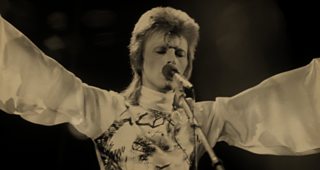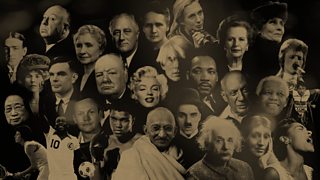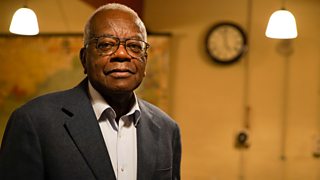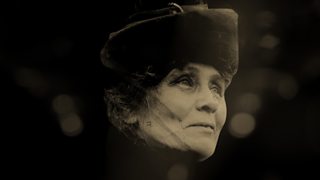The Finalists
Four weeks; seven categories; one ultimate winner. You have chosen Alan Turing as your greatest person of the 20th century.
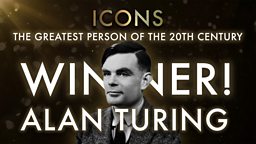
Across the series ICONS has asked you to assess the achievements of the 20th century's most important and influential figures from seven different fields of human endeavour. You’ve picked your greatest Leader, Explorer, Scientist, Entertainer, Activist, Sports Star and Artist or Writer. Now in the ICONS live final you’ve voted Alan Turing as the greatest of them all, beating Nelson Mandela, Ernest Shackleton, David Bowie, Martin Luther King Jr, Muhammad Ali and Pablo Picasso. Explore below to find out just why he was so exceptional – and what contribution the other six finalists made to the course of the 20th century, and our world today.
Alan Turing
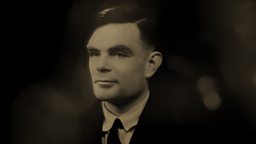
Lived: 1912-1954
Born: London, UK
Known for: Considered the father of the computer and World War Two code-breaker
Alan Turing’s calculations made computers possible and helped win a war.
Those who can imagine anything, can create the impossible.
1. He invented the computer – and stops you getting spammed
Turing’s mathematical genius allowed him to foresee the possibility and function of computer like machines before the existence of the necessary technology. Laying out the theory for such devices in an essay in 1936, his revolutionary work provided the foundation for modern computers. He later came-up with the ‘Turing test’ to determine whether a machine is intelligent – or not. The principles of it are reversed online today, when a computers sets you a CAPTCHA test (like distorted letters) to prove you’re a human and not a rogue bot!
2. His machines helped win a war
At the start of World War Two Turing, along with other mathematicians, was recruited to break enemy codes. Working at Bletchley Park, Turing built a machine called a Bombe. It sped-up code-cracking efforts from weeks to hours by trying multiple permutations. The information gleaned helped the Allies gain an upper hand in the war.
3. His legacy has helped change social attitudes in Britain
Turing was a gay man at a time when homosexuality was illegal. Despite his wartime contribution he was arrested for gross indecency in 1952 and given a stark choice between prison and chemical castration (opting for the latter). The arrest also lost him his security clearance and two years later Turing died of cyanide poisoning – whether it was suicide or not is still debated. A campaign to grant him a pardon, fittingly started by e-petition, resulted in him being granted one posthumously in 2013. A subsequent legal amendment dubbed Turing’s Law pardoned 65,000 other people convicted of the same ‘crimes’.
Category Winners
-
![]()
Pablo Picasso
Artists & Writers Winner
-
![]()
Muhammad Ali
Sports Stars Winner
-
![]()
Martin Luther King Jr
Activists Winner
-
![]()
David Bowie
Entertainers Winner
-
![]()
Alan Turing
Scientists Winner
-
![]()
Ernest Shackleton
Explorers Winner
-
![]()
Nelson Mandela
Leaders Winner
Learn more about the other finalists...
Pablo Picasso
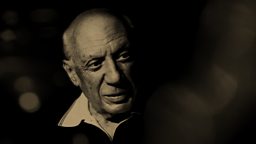
Lived: 1881-1973
Born: Málaga, Spain
Known for: Pioneering, genre-mashing modern artist
Possessing a genre-spanning genius, artist Pablo Picasso saw the world in a new way.
Others have seen what is and asked why. I have seen what could be and asked why not.
1. He refused to be tied down
Picasso’s work spans a head-spinning variety of styles, genres, art forms and ideas. From drawing to painting, sculpture to poetry – and beyond – Picasso never allowed himself to be restricted. What’s more, he consistently evolved and changed his styles, taking influence from the places he lived – including Madrid, Barcelona and Paris – and the writers and artists he met along the way. Yet there was a coherent vision behind this creativity, a way of feeling the world that permeated all of Picasso’s art.
2. He invented a new way to represent reality
Rejecting the rules of painters who had gone before him, Picasso’s more abstract work led to him creating a new style of painting with a handful of fellow artists in Paris around 1907. Cubism was a new, complex response to the fragmentary way the artist perceived society and it inspired similar movements in architecture and literature. With the emergence of the Modern Art movement, Picasso helped to influence a whole new visual language fit for the 20th century.
3. He confronted rather than escaped the world
While some artists can be accused of cutting themselves off from the rest of society, the always politically-aware Picasso engaged with it. When his home country Spain was torn apart by civil war in the 1930s Picasso painted Guernica. This was in response to the bombing of a civilian population. It has a stark anti-war message – which still resonates today – and it brought the brutal conflict to a global audience.
Muhammad Ali
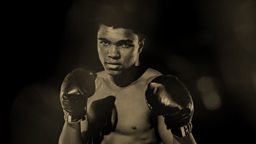
Lived: 1942-2016
Born: Louisville, Kentucky, US
Known for: As the boxer said himself, he was “the greatest”
Fighting in the ring or for his rights, Muhammad Ali was The Greatest.
Don鈥檛 count the days, make the days count.
1. His bouts didn’t end in the ring
Ali was a successful black man living during one of the most turbulent periods for race relations in American history. For some that was a provocation in itself. But Ali was never afraid to speak up, even when his views were controversial – expressing his strong opinions on race, religion and war. His frank stance on politics and society upset the conservative establishment of 1960s and 70s America. He was stripped of titles, banned from his boxing and threatened with prison. Yet his determination, principles and fearlessness in speaking out ensured Ali won through eventually – both in and out of the ring.
2. He said he was “the greatest”; he had a point
Declaring yourself “the greatest” might seem like a fate-tempting, self-aggrandising statement, but Ali fought to live up to the standards he set himself. His impressive fighting style combined with his charismatic personality took boxing to another level. His two epic bouts – the Thrilla in Manila against Joe Frazier and the Rumble in the Jungle versus George Foreman – weren’t just great boxing matches, they became two of 20th century’s great stories.
3. He had to fight to the very end
In 1984 Ali was diagnosed with Parkinson’s Disease but he was determined to carry on making a difference. He made goodwill missions to Afghanistan and North Korea, he brought medical supplies to Cuba and even helped to secure the release of 15 American hostages from Iraq before the 1990 Gulf War; all in spite of his own suffering.
Dr Martin Luther King Jr
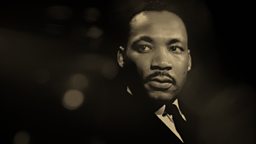
Lived: 1929-1968
Born: Atlanta, USA
Known for: American civil rights leader who campaigned for black rights
Martin Luther King, Jr had a dream of an equal America, free from racial discrimination.
Injustice anywhere is a threat to justice everywhere.
1. He made sure it was the end of the line for segregation in America
In 1955 Rosa Parks refused to give up her seat on a segregated bus in Montgomery, Alabama. This sparked a 13-month mass protest boycotting the public buses led by Dr King. He had been inspired by Gandhi’s use of non-violent resistance – and it paid dividends. The boycott was a defining moment in the emerging civil rights movement in the United States and it ended segregation on buses just over a year later.
2. He forced a country to be honest with itself
King showed how local discrimination was a stain on the USA as a whole. In 1963 he highlighted how Birmingham, Alabama was “the most segregated city in America”, leading to television cameras capturing brutal images of police repression. King’s sentiments and campaigning found expression in a rally attended by over 250,000 people in Washington D.C. Here the pastor-turned-activist delivered his I Have A Dream speech; one of the greatest pieces of oratory of all time. It’s no coincidence that the US Congress outlawed segregation in public spaces just a year later in 1964.
3. His dream inspired a world he didn’t live to see
King’s activism wasn’t without its costs. Arrested and spied on, in 1968 he was assassinated in Memphis by a far-right gunman. Yet the forces of change that King ignited could not be stopped. The US has continued to take strides towards equality, with progress on segregation, voting rights, the election of America’s first black president in 2008… and the dedication of an annual federal holiday to Martin Luther King Jr’s memory. In the 21st century, there remain significant battles to be fought, but King’s dream continues to inspire. Movements like Black Lives Matter, #MeToo and March for Our Lives all draw on and continue his fundamental message of nonviolence and equality.
David Bowie
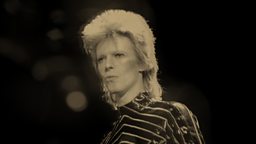
Lived: 1947-2016
Born: London, UK
Known for: An innovator constantly at music’s cutting edge
David Bowie’s cutting-edge music gave the world the sound of the future, today.
We can be heroes just for one day.
1. He was always at the cutting edge
Often adopting a series of personas, and never afraid to reinvent his sound, David Bowie was a constant musical innovator – keeping him ahead of the pack. The characters he created, from Ziggy Stardust to the Thin White Duke, allowed him to inhabit new sonic landscapes. And Bowie astutely picked the best collaborators to help him achieve his goals. Unlike many other musicians, he remained current for his entire career.
2. He was an early adopter
Bowie sang of the future, but he was also keen to embrace it off-record. An early champion of internet technology, his 1999 album Hours was the first by a major artist to be made available as a download (pub fact: Spotify founder Daniel Ek was just 16 at the time.) He also briefly ran an internet dial-up service called BowieNet.
3. He will be missed, but he left something special behind him
The announcement of David Bowie’s death on 10 January 2016 shocked the world. It wasn’t just that one of music’s greatest icons had passed, but he had just released a brand-new album the week before. Bowie had turned his own impending death from cancer into the inspiration for this final work: Black Star. On its release, fans and critics had speculated about the songs’ meaning for a week, before their true depth was revealed. Few of us are truly prepared to confront death but David Bowie turned his into art.
Ernest Shackleton
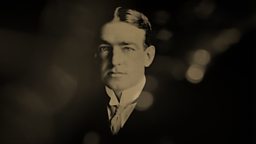
Lived: 1874-1922
Born: Kilkea, Ireland
Known for: Polar explorer and pioneer. Led the famous ‘Endurance’ expedition
Adventurer and man to get you out of jam, Ernest Shackleton escaped after being stranded in Antarctica
Difficulties are just things to overcome, after all.
1. He had ‘Endurance’ in more ways than one
Shackleton was probably tempting fate in 1914 when he set off in his boat, Endurance, on an expedition to cross Antarctica via the South Pole. Still, it was a quality he and his crew all shared. After the ship got trapped in the ice and eventually sank, they were all left stuck on a vast bit of ice for over two months.
2. He never lost hope
Shackleton and his crew escaped in lifeboats to the tiny Elephant Island… but it was uninhabited and inhospitable. Not one to be deterred, Shackleton went out in search of help – no mean feat when they were 800 miles from civilisation. First, he sailed with five of his men across near frozen seas in one of the tiny, open lifeboats. Then, having landed on the island of South Georgia, he had to lead a mountain climbing expedition, with no map, across the island before eventually reaching a base on the other side.
3. He got everyone home
Without the modern aids of radios, GPS or emergency helicopters Shackleton achieved the near impossible. Once he reached help, rescue parties were sent for his crew and, remarkably, every single member made it home. One of his contemporaries later commented, whatever qualities other polar explores, like Scott of the Antarctic or Roald Amundsen, had: "when disaster strikes and all hope is gone, get down on your knees and pray for Shackleton."
Nelson Mandela
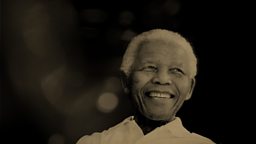
Lived: 1918-2013
Born: Mvezo, South Africa
Known for: Defeated apartheid became South Africa’s first black president
His body was abused but his mind remained free, Nelson Mandela’s sacrifice helped defeat apartheid.
It always seems impossible until it's done.
1. He made difficult decisions
In 1952 Mandela was the deputy president of the African National Congress – a party determined to overthrow the racist apartheid regime in South Africa. Initially its policies were non-violent, but this changed after state police killed 69 black activists in 1960. Now the ANC, and Mandela with it, agreed to attacks on the state. Railway tracks, power lines and government buildings were all targeted and though the intention was never to kill, lives were lost.
2. His resilience inspired the world
After his arrest in 1962 Mandela was sentenced to life in prison and he was held on the remote Robben Island. He endured long stints of solitary confinement, often going without sleeping or toilet facilities – treatment designed to reinforce Mandela’s sense of powerlessness. Yet the opposite happened. Mandela became the focal point for a global campaign against apartheid which eventually forced the South African government to change its mind. He was finally released in 1990.
3. He was president for a whole nation
Once Mandela was elected president in South Africa’s first free elections in 1994 he did not seek retribution, despite his brutal prison treatment. Instead, he governed for the whole country, arguably preventing a civil war. The Truth and Reconciliation Commission, which aimed to heal South Africa through confession and forgiveness rather than revenge, was established during his time in office. It has since been used as a model for other countries.



